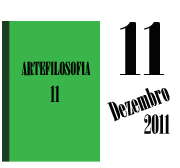“1970”:
um argumento
Resumo
O artigo defende que um período recente, situado ao redor da década de 1970, produziu uma descontinuidade forte na história do pensamento, inaugurando uma mudança ainda em curso. Caracteriza-se então esta mudança, em seus eixos principais. Como exemplo das possibilidades que ela inaugura, apresentam-se as implicações da sua política e da sua epistemologia para a teorização do juízo, da subjetividade e da experiência estética. Entre os temas abordados, estão o impacto sistêmico da “revolução mundial” de 1968, o aumento do interesse pelo “popular”, a quebra do cronótopo do “tempo histórico”, os conceitos de self-cause, a deslegitimação epistemológica do determinismo, as novas descrições do self (em suas implicações para a teorização da experiência estética) e as implicações da atomização democrática para o juízo estético e político.
Downloads
Referências
BURKE, Peter. Popular culture in early Modern Europe. Burlington: Ashgate, 1994.
CERTEAU, Michel de. A invenção do cotidiano. Petrópolis: Vozes, 2002.
CERTEAU, Michel de. “A operação historiográfica”, in: A escrita da história, pp. 65-119. Rio de Janeiro: Forense Universitária, 2007.
DAWKINS, Richard. O gene egoísta. Belo Horizonte: Itatiaia, 2001.
DELEUZE, Gilles. Lógica do sentido. São Paulo: Perspectiva, 1988.
DELEUZE, Gilles. Diferença e repetição. São Paulo: Graal, 2006.
DELEUZE, Gilles, e GATTARI, Félix. O anti-Édipo –capitalismo e esquizofrenia. Lisboa:Assírio & Alvim, s/d.
DELEUZE, Gilles, e GATTARI, Félix. Mil platôs, vol. 1. Rio de Janeiro: Ed. 34, 1995.
DENNETT, Daniel C. Consciousness explained. New York: Back Bay Books, 1991.
DENNETT, Daniel C. Darwin’s dangerous idea. Evolution and the meanings of life. New York: Simon & Schuster, 1995.
DRETSKE, Fred. Perception, knowledge and belief. Cambridge: Cambridge University Press, 2000.
FOUCAULT, Michel. As palavras e as coisas. São Paulo: Martins Fontes, 1995.
HOLLAND, John H. Emergence. From chaos to order. New York: Basic Books, 1998.
ISER, Wolfgang. O ato da leitura, vol. 1. Rio de Janeiro: Ed. 34, 1996.
JAUSS, Hans Robert. A história da literatura como provocação à teoria literária. São Paulo: Ática, 1994.
JUARRERO, Alicia. Dynamics in action. Intentional behavior as a complex system. Cambridge: The MIT Press, 2002.
KITTLER, Friedrich A. Discourse networks 1800/1900. Stanford: Stanford University Press, 1990.
KOSELLECK, Reinhart. Futures past –on the semantics of historical time, pp. 26-42. New York: Columbia University Press, 2004.
LACOUE-LABARTHE, Philippe; NANCY, Jean-Luc. L’absolu littéraire. Théorie de lalittérature du romantisme allemand. Paris: Seuil, s.d.
LIPOVETSKY, Gilles. O império do efêmero. São Paulo: Companhia de Bolso, 2009.
LUHMANN, Niklas. Social systems. Stanford: Stanford University Press, 1995.
LUHMANN, Niklas. “What is communication?”, in: Theories of distinction. Redescribing the descriptions of Modernity. Stanford: Stanford Univ. Press, 2002, pp. 155-168.
LUHMANN, Niklas. “How can the mind participate in communication?”, in: Op. cit., pp. 169-184.
MATURANA, Humberto. A ontologia da realidade.Belo Horizonte: Ed. UFMG, 2002.
MILLIKAN, Ruth Garret. Language: a biological model. Oxford: Oxford University Press, 2005.
PRIGOGINE, Ilya. The end of certainty. Time, chaos, and the new laws of nature. NewYork: The Free Press, 1997.
SEMO, Enrique (org.). 1968: raízes y razones. Ciudad Juárez: UACJ, 1999.
SMITH, Barbara Herrnstein. Contingencies of value. Alternative perspectives for critical theory. Cambridge: Harvard University Press, 1988.
TOMASELLO, Michael. Origens culturais da aquisição do conhecimento humano. São Paulo: Martins Fontes, 2003.
UNGER, Roberto Mangabeira. Política – os textos centrais. São Paulo: Boitempo, 2001.
WALLERSTEIN, Immanuel. The uncertainties of knowledge. Philadelphia: Temple University Press, 2004.
ZUMTHOR, Paul. Oral poetry: an introduction. Minneapolis: The University of MinnesotaPress, 1990.
ZUMTHOR, Paul. A letra e a voz. A“literatura” medieval.São Paulo: Cia. das Letras, 2001.
Copyright (c) 2017 Revista ArteFilosofia

This work is licensed under a Creative Commons Attribution-NonCommercial-ShareAlike 4.0 International License.
Autores que publicam nesta revista concordam com os seguintes termos:
- Autores/as mantém os direitos autorais e concedem à revista o direito de primeira publicação, com o trabalho simultaneamente licenciado sob a creativecommons.org/licenses/by-nc-sa/4.0/ que permite o compartilhamento do trabalho, com reconhecimento da autoria e publicação inicial nesta revista.
- Autores/as têm autorização para assumir contratos adicionais separadamente, para distribuição não-exclusiva da versão do trabalho publicada nesta revista (ex.: publicar em repositório institucional ou como capítulo de livro), com reconhecimento de autoria e publicação inicial nesta revista.


